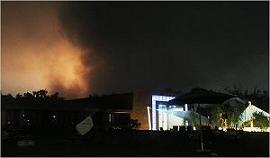Massive explosions rattle the Libyan capital for the second night late Tuesday, as NATO continued its two-month-old alliance bombing campaign.
Massive explosions rattle the Libyan capital for the second night late Tuesday, as NATO continued its two-month-old alliance bombing campaign.At least five explosions rang out in the area around Muammar Gaddafi's Bab al-Aziziya compound.
Media reported large plumes of smoke could be seen drifting over the city.
NATO said Bab al-Aziziya compound has been used by the regime as a base for troops and vehicles used to carry out attacks on civilians.
But Libyan authorities said NATO was trying to kill Col Gaddafi and that the night-time strikes are terrorizing Tripoli residents.
A senior NATO official said the regime had become "very apathetic" in the last fortnight.
"It has lost the military initiative and appears on the defensive, which is a sign that we are on the right path," the unnamed official was quoted as saying by the AFP news agency.
Opposition forces control much of Libya's east, but Col Gaddafi's forces are still in control of most of the west of the country.
INTERNATIONAL ACTIONS
France has announced it was deploying attack helicopters to escalate their strike power. The UK has said it was considering doing the same.
But Russia has condemned the air strike strategy, saying only strikes intended to protect civilians.
The Russian foreign ministry's human rights envoy at UN, Konstantin Dolgov, said targets which had no military use had been destroyed and that the strategy was "in no way moving us closer toward achieving the overall goal of quickly ending the armed conflict".
He added: "Air strikes are not stopping the military confrontation between the Libyan parties and only creating more suffering among peaceful civilians."
Russia has been attempting to broker a ceasefire between the government and the opposition, and has met with representatives of both sides in the past week.
For his part, South African President Jacob Zuma is to visit Libya next week for meetings with Gaddafi in an attempt to resolve the conflict.
But Zuma's office dismissed speculation that meeting was intended to discuss an exit strategy for the leader.
